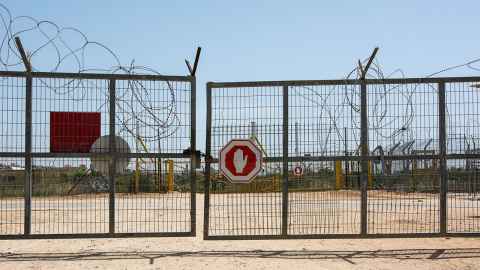Lessons from another lockdown
1 April 2020
Opinion: Nicholas Rowe draws some parallels between the restrictions in West Bank and Gaza Strip during the second intifada and the current lockdown in New Zealand.

Covid-19 and New Zealand’s national lockdown means online teaching has become the new ‘normal’ at the University of Auckland.
The process of guiding our staff towards remote learning has brought back many memories of my former life in the Occupied Palestinian Territories during the second intifada and provided invaluable experience on how to cope with the shock of sudden change and adapt to it.
I lived in the West Bank for eight years, from 2000 to 2008, and spent months at a time under curfew and closure by the Israeli military. This meant all schools, universities and businesses would be shut, movement between cities and towns was heavily restricted, no public gatherings were allowed and for most of the day people were confined inside their homes.
While the causes and context of the restrictions in West Bank and Gaza Strip during the second intifada were markedly different from the current lockdown in New Zealand, there are notable parallels. These parallels have prompted how I have approached my own preparations for this pandemic lockdown, and in how I have guided my Faculty’s approach to this sudden shift.
First, this has involved anticipating that the psychological impact of this sudden shutdown will outweigh the damage wrought by the pandemic itself. In Palestine, there was a sudden, pervasive lethargy; a sense of being overwhelmed, disorientated and despondent as a result of the abrupt change to daily rhythms.
In New Zealand, we might consider our mental health as at equal risk as our physical health, particularly as the inevitable tragedy of the pandemic makes itself felt. As activities and thoughts that previously provided us with meaning and purpose lose their value, we can become more and more disengaged from each other and our social and professional responsibilities.
While platitudes abound that this crisis will inevitably bring us together in solidarity, the reality is that it can also pull us apart, or bring us together in a way that fosters totalitarian regimes of intolerance.
In Palestine, a key to moving beyond this experience of lethargy was through social engagement. As our values and meanings are socially constructed, it is essential that we maintain connection and vibrant discussion during massive social upheavals. While these discussions ostensibly allow us to effectively organise as a group, more importantly they allow us to share and affirm new sets of meanings and purposes in a radically transformed world.
In Palestine, I was socialised through organising community arts activities for children in refugee camps, with other artists working in Ramallah. In New Zealand during Covid-19, this socialisation has involved coordinating online teaching plans with the teachers in my faculty to serve the remote learning needs of students.
Two key themes have emerged during this process: the importance of communication and permission to change.
The disruption to a daily routine can be a deeply alienating experience, leaving so many value-based uncertainties: what should or should not happen? Feeling that it is okay to communicate this bewilderment to others (students, teachers, peers, managers) is a central part of the process of adapting to the new reality. These expressions will not always be well-managed. If we can recognise that people are expressing themselves in odd ways as a process of adaptation, rather than as a response to our own behaviour, the more confident we can feel in the need to maintain social bonds.
Providing permission is another key step in adapting to a new reality. In Palestine, this involved changing arts practices to suit the context of a military incursion. In New Zealand, this has involved significantly shifting modalities of teaching and assessment to suit distance learning. Feeling permitted to make these changes, and to freely experiment with them, can be very important.
Within an institution like the University of Auckland, in which the stability of the curriculum and assessment is deeply entwined with the institutional identity, such permission and agency needs to be actively promoted to staff. Teachers and students will want to be assured that changes can be really valuable, and that not every change equals a “loss” to the system.
Finally, adaptation to a new reality requires iterative assurance, which means repeating information in new ways to people, as they grapple with a natural inclination to keep denying that the change has happened. This denial can manifest repeatedly in small ways, as details about the new reality continue to emerge. Being patient with these processes of realisation can allow everyone to feel they are travelling through this experience together, and that no one is getting left behind.
While platitudes abound that this crisis will inevitably bring us together in solidarity, the reality is that it can also pull us apart, or bring us together in a way that fosters totalitarian regimes of intolerance. If we really seek to maintain our complex, diverse and pluralist ways of communing, practising communication and promoting a permission to adapt will be essential.
Dr Nicholas Rowe is an Associate Professor of Dance Studies at the University of Auckland and Associate Dean COVID-19 for the Faculty of Creative Arts and Industries.
This article reflects the opinion of the author and not necessarily the views of the University of Auckland.
Used with permission from Newsroom Lessons from another lockdown 1 April 2020.
Media queries
Alison Sims | Research Communications Editor
DDI 09 923 4953
Mob 021 249 0089
Email alison.sims@auckland.ac.nz